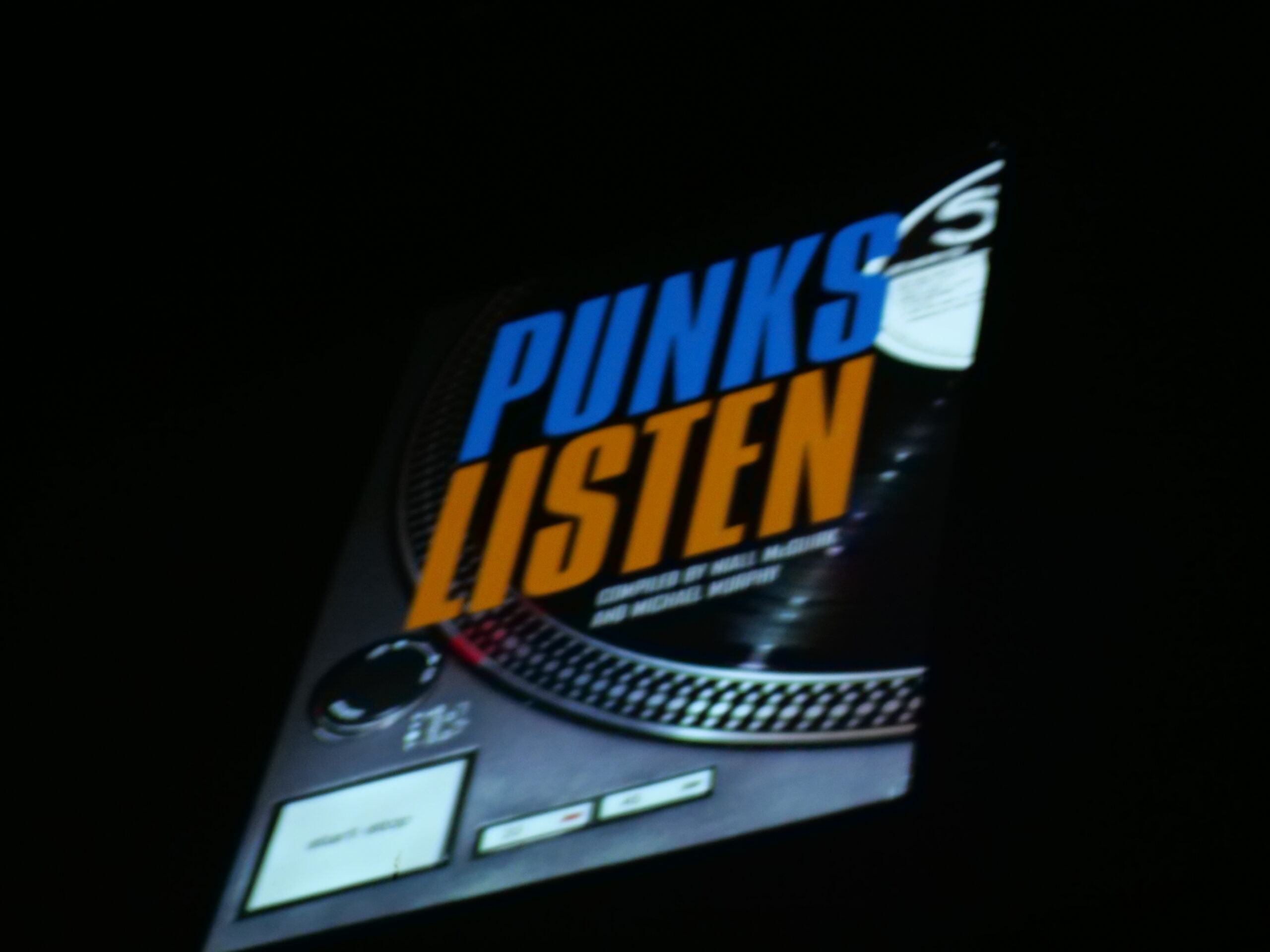From Whelan’s, Dublin on 08/11/2022
The new book Punks Listen is a compilation of writings from various writers, actors, journalists, musicians and others discussing their favourite albums and it features contributions from the likes of Henry Rollins, Amanda Palmer, Roddy Doyle, Mike Watt, Steve Ignorant, Matt Pinfield, Andy Cairns, Gaye Black, Michael Azerrad and many, many more.
The book is co-edited by Niall McGuirk and Michael Mary Murphy – two very revered figures in Irish music – and is the third in a series of books by them in a similar vein; following 2017’s In Concert: Favourite Gigs of Ireland’s Music Community and 2020’s Great Gig Memories: From Punks and Friends, with the former having its proceeds go to the Irish Red Cross and the latter to NHS Charities Together during the COVID-19 pandemic. In a similar altruistic fashion, the money from the sales of Punks Listen will go to the Irish Red Cross’s Ukraine Crisis Appeal.
For those unfamiliar with the editors, Niall McGuirk began the Hope Collective (who published all three of the aforementioned books) in the ‘80s. Born from a genuine commitment to the punk D.I.Y. ethos, the Hope Collective was a socially conscious co-op in a very socially unconscious Ireland. They concerned themselves with supporting the arts and live music while also fundraising for charities and creating a promotion for forward-thinking ideas beyond the hegemony of Ireland at the time. Some of these causes included veganism, reproductive rights and sex education, feminism, and spreading accurate information on HIV/AIDs and contraception.
The Collective exists today as a blog run by McGuirk, who is still very much in touch with the music scene in Ireland. While the Hope Collective would briefly publish a record of Irish music and were involved with fanzines, it is undoubtedly best known for its music promotion, under the Hope Promotions label. For 14 years between 1985-1999, Hope Promotions would bring independent music acts (they refused to work with major label artists for various reasons) the world over to Ireland. They are most synonymous for their concerts with the legendary Washington, D.C. post-hardcore band Fugazi, but they also staged the first Irish concerts for the likes of Green Day, NOFX, Jawbreaker, Bikini Kill, Refused, Nomeansno and so many more. Hope was also the breeding ground for future music promoters, most notably Timo of u:mack.
Michael Mary Murphy came from the same punk background in Dublin as McGuirk. While he too was involved with Hope, his trajectory went slightly differently. He left Ireland to move to London in the late ‘80s and found success working within the music industry. He worked for the Virgin and Imago record labels respectively, before becoming the manager for artists and finding his own management company. He also studied music academically and earned a PhD. He has since published many peer-reviewed essays on music (mostly on the subjects of punk and post-punk music) and currently resides as a lecturer at the Dun Laoghaire Institute of Art, Design + Technology (IADT), where he teaches in the areas of music management, industry and history.
Given their credentials, connections and unanimous respect, it’s no wonder that the book launch for Punk Listens at the legendary music venue Whelan’s on Wexford Street, Dublin was full of people in total support of the campaign.
The night began with Murphy thanking everybody for coming out, while talking about the effort of making the book and the many degrees of separation they went through to get some of the contributors. It was simply by asking people they knew and asking those people to similarly ask people that they knew that the book came together.
In addition to the funds from the book sales, there was a raffle to raise additional funds for the Red Cross’s appeal, with the most coveted prize seeming to be a copy of Bono’s autobiography Surrender, complete with lighter and fluid, as generously donated by Paranoid Visions guitarist Peter “P.A.” Jones, who thought it would be “…good for older people in the winter, in the cold.” On a more sombre note, there were also records from the collection of the late Philip Chevron of The Pogues and The Radiators from Space fame up for grabs, as a tribute to the greatly missed musician.

Fred Phelan of the Irish Red Cross was then invited on stage to discuss where the funds from the book were going, and then Murphy gave a speech not too dissimilar to one of his college lectures (Disclosure: This author is a former student of Murphy’s) on the history of the consumption of music, how the British record label EMI had surpassed an Irish regulatory act to open a manufacturing plant in Co. Waterford and how the history of popular music had been dictated by men in the production and consumption of music, up until, by Murphy’s estimate, around 2008, when women began succeeding men in music sales.
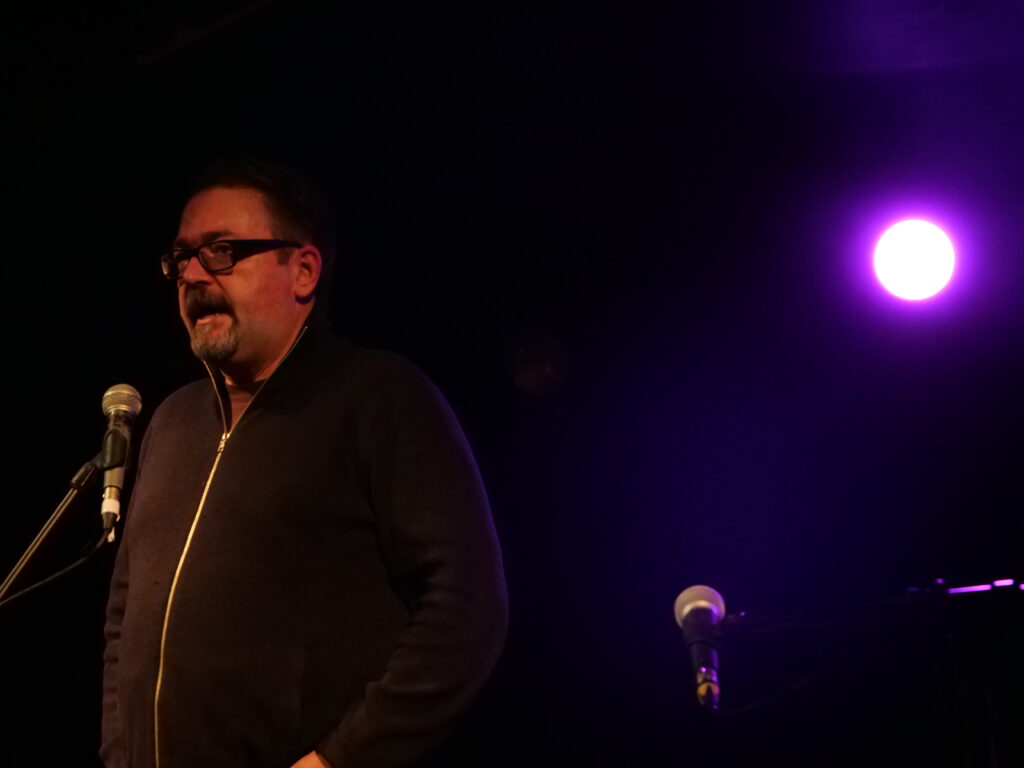
This served as a segue to the first panel of the night, hosted by Murphy and featuring photographer and academic Orla Fitzpatrick, designer and historian Linda King and Hot Press journalist Roisin Dwyer, whom Murphy interviewed on the topic of their first record and their history of music consumption.
Fitzpatrick spoke on how her journey from buying a Bright Eyes record on Thomas Street would eventuate in her transitioning into a Sisters of Mercy-loving goth. Dwyer talked of how at age 13, she got a copy of Thin Lizzy’s Live and Dangerous from her brother-in-law and taped it and listened to it constantly on her sister’s Walkman. At school, she met like-minded people and started hanging out at Fibber Magees. For her, the summer of 1992 was an important one in her foundation, seeing acts like Alice in Chains at the SFX and hearing hip-hop like N.W.A. and Public Enemy at Fibbers. For King, her father played an instrumental role in her musical interest, as he was always “…playing music, singing music, whistling music.”
Her father would listen to anything from The Dubliners to Kris Kristofferson, but it was Johnny Cash, particularly his At San Quentin live album, which had the most impact on her from his collection. She talked of how she and her father had tickets to see Johnny Cash in Dublin in 1994, but he kept cancelling performances due to ill health, including the Dublin show, and he never came back to Ireland after that. She also recalls buying some records by The Police for £4.99 each in the early ‘80s and her mother being shocked at her spending her entire pocket money on albums. She found this memory triggered when, forty years later, she bought her son his first record player and was now playing the role of the shocked mother after finding out that he paid €47.99 for an album!
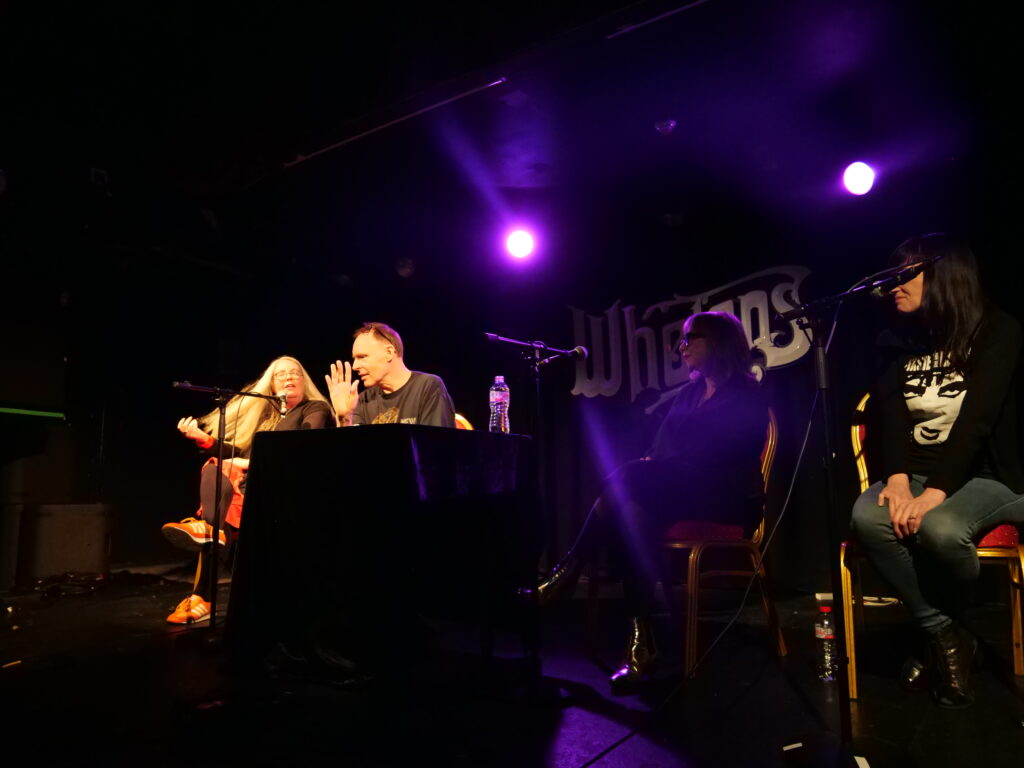
After a brief intermission, Irish Times writer and fictionalist John Fleming took the stage to give a reading of his contribution to Punks Listen, simply titled “1977…,” which mixed the struggles of growing up and the angst and confusion of late teenagerhood verging onto adulthood with the music of that time of life and how it engrains such a significance to you then and ultimately your life thereafter, to create a very bittersweet nostalgic reverie.

The night’s second panel soon followed, this time hosted by Dwyer, and featuring Vulpynes guitarist and vocalist Molly, Troubled Pilgrims bassist Brendan Lynott, vocalist and guitarist for Female Hercules Michael “Conzo” Connerty and Bernie Furlong from The Golden Horde. Each panellist was there to discuss their reasoning for the album or single picked for their respective contribution to the book and how they went from music fans to musicians themselves.
Their choices were: New York Doll’s “Personality Crisis” single for Furlong, Dexys Midnight Runners’ Too-Rye-Ay album for Lynott, the Nuggets compilation album from 1965-1968 for Conzo, and The Distillers’ Coral Fang album for Molly. Conzo and Furlong talked about the significance of compilation albums for the pre-internet discovery of new artists. Despite the generational difference that could possibly be seen between Molly and the other panellists in regards to her choice (and Molly is indeed decades their junior), she shared a link with Lynott in her parents being a gateway into the music she would love, whereas, for Conzo and Furlong, it was very much autodidactic.
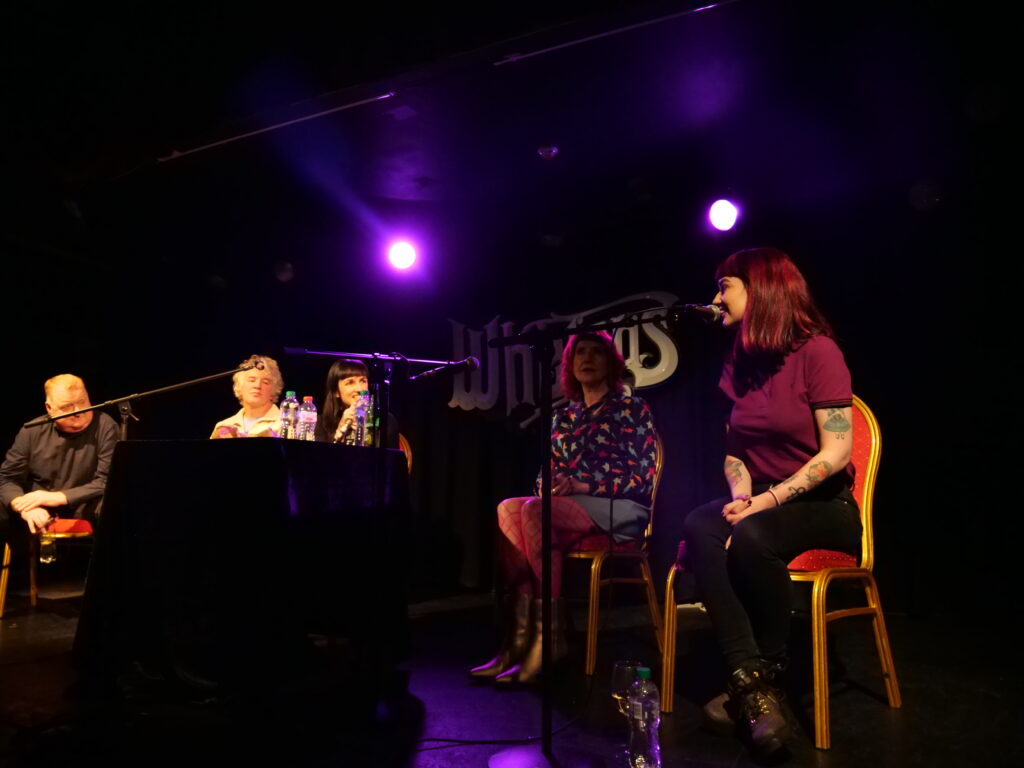
After another brief break, Rónán Hession (P/K/A Mumblin’ Deaf Ro) came out of, what he called, “semi-retirement” to take the stage and perform a cover of Billy Bragg’s “The Saturday Boy,” off his album of choice for the book, Brewing Up with Billy Bragg. He then played the opening track off of, as he put it, “My most recent album, which is 13 years old,” Dictionary Crimes, “Cheer Up Charlie Brown,” which was the album selected for the book from actor Aidan Gillen.
Hession was then joined by Gillen, writer and critic Sinéad Gleeson, who recently co-edited the book This Woman’s Work: Essays on Music with Kim Gordon of Sonic Youth fame, and Irish Times features writer Patrick Freyne for the final panel of the night, also hosted by Dwyer. In this discussion, Dwyer asked the panellists about their personal histories with music.
Hession spoke of his memory of buying Welcome to the Beautiful South at the Golden Discs at the Artane Castle Shopping Centre. Gleeson talked about sending away for records from the back of music magazines and how the current CEO of the legendary Sub Pop Records Megan Jasper’s first job at the label in the ‘80s was overseeing mail orders, and how she told Gleeson that she remembered sending albums from Seattle to Ireland. Gillen spoke of how he was the youngest of six kids, and the household always had stuff like ABBA, Kate Bush and Queen playing in the background, but his older brother had an interest in “cooler” artists, like Pere Ubu, Frank Zappa, and The Mothers of Invention, which, when combined, influenced him to get into acts like Duran Duran and Depeche Mode.
Freyne spoke of his first love, the Pipes of Peace album, which he steadfastly declares was the best thing Paul McCartney has ever done, including his work with The Beatles! He then went on to talk about a process he went through of denying what type of music he actually liked as a teenager due to peer pressure until a friend who was a punker attempted to get him into punk. While Freyne was not a fan of the music itself, he appreciated the punk ethos and community – including Hope and Dead Elvis Records – which helped him come more into himself and not be afraid to admit what he likes.
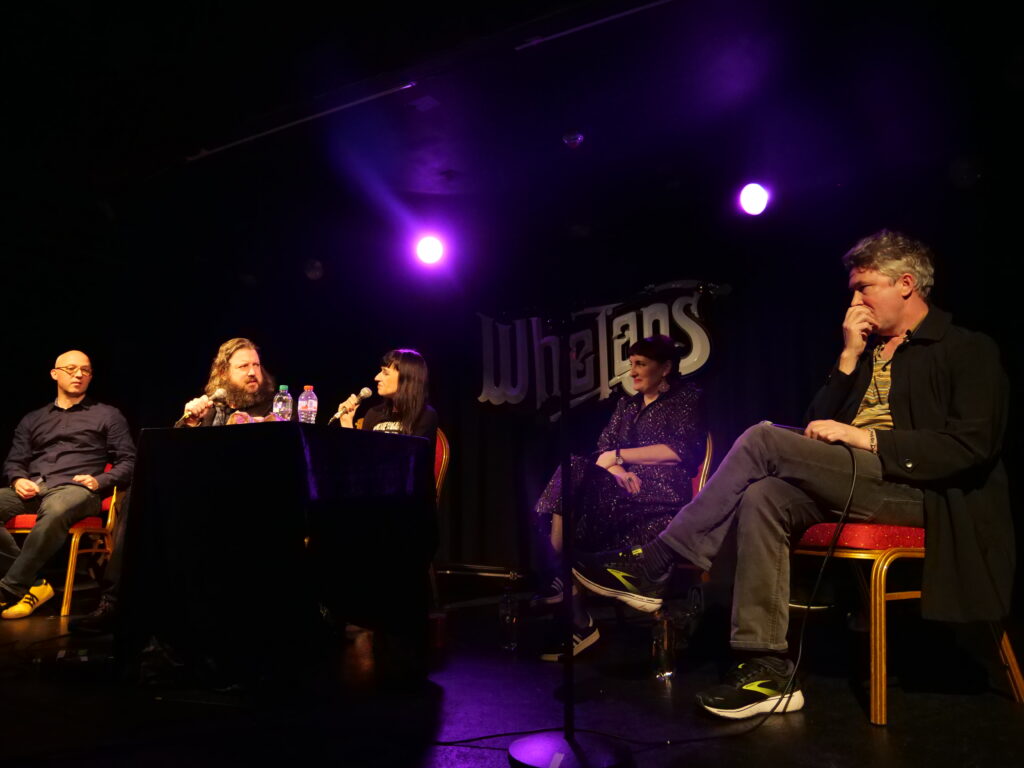
Gillen spoke of his love for jukeboxes and finally realising his dream of owning one and the woes of making that dream a reality. Gleeson then spoke on the development of This Woman’s Work and the stories within. Hession spoke on the importance of music for developing ideas and how music should be a springboard to elevate unique thoughts, rather than encouraging an appropriation of the songwriter’s thoughts. Gleeson and Freyne then talked about music criticism and the futility of trying to encapsulate the experience of music in words (a subject that this author was very sympathetic to).
Hession spoke of how his main way of supporting artists now is through the purchasing of t-shirts over, say, vinyl or CDs. He also briefly spoke of the potential ephemerality of music streaming, as platforms such as Spotify or Apple Music could potentially fold someday, and that music could someday be lost in time, like tears in the rain (Note: The Blade Runner reference was an editorial addition). Gillen supported that claim by saying that he recently deactivated his Spotify account. For him, since the advent of Napster, when music became widely available through .mp3 formats, there has been too much music present all the time to be inundated with and he wants to get away from it. He then spoke of how the pandemic rejuvenated his love of live concerts, as he now has the excitement of going to concerts that he once had as a kid. He also spoke of the importance of gig-going as you never know if the people you will be seeing will be around, particularly highlighting how he was able to see artists like Jay Reatard and David Berman of Silver Jews before their passings. He then encouraged everyone to see Michael Head when he performs at Whelan’s on November 30th.
Murphy took the stage once more, and they were even gracious enough to boot up the PA system for him to announce the winners of the raffle after having turned it off due to the event going into overtime. For what it’s worth, the U2-branded kindling was the first to go. Murphy then reiterated Gillen’s point on the importance of attending shows, and how everyone should go to every concert they can, big or small, because you never know what you will get. He regaled a story of seeing Neil Young live in 1988, as an angsty youngster, because he thought Young would die soon and he wanted to have the ability to say that he saw Young once and he was shit, but the show turned out to be fantastic.
While the night was fun and intriguing and a real treat for a certain enclave of music fans (of which this author would consider himself), the heart of its reason for being was not lost on Murphy for a second. This book and its inducement were born of a humanitarian instinct, one which makes McGuirk and Murphy so inspirational to multiple generations of people who are savvy to them. The blue and yellow making up the Punks and Listen on the front of the book’s cover are what this is all about. In many ways, we in “first-world,” “Western,” “developed” nations or however you wish to classify it, have the very good fortune of being able to sit around a music venue on its one day off of countless rackets to sit and discuss something proportionately frivolous like our love of music, while others cannot, due to substantially significant issues like war; a fact that Murphy is very much aware of. After the event, we asked Murphy if any of the choices from any of the contributors surprised him. His answer was more earnest and elegiac than expected.
“A lot of them [the submissions for the book] really, really intrigued me,” Murphy responded. “I don’t know if it was post-pandemic, [but] people really seemed to excavate their hearts, their feelings. There’s a lot of blood, I think, on the lines of this book. People really felt it. One that shocked me, that I actually can’t read anymore, was the one from the Ukraine [sic], from Sasha, who’s become our friend, and, y’know, just the fact that he was writing, saying, ‘I can’t think about my favourite record, ‘cause bombs have just fallen in my city and I’m looking for ways to distract my daughter from asking me are we going to die or what’s going to happen.’ So, I’ll tell ya what was surprising, wasn’t just reading that, but what happened with that. I sent that to my friend who used to work for me, Dave – David Bason in Los Angeles – and he said, ‘That’s incredible.’ And Sasha mentioned New Model Army and he mentioned Pearl Jam, and he said, ‘You’ve got to get that to Pearl Jam,’ and I said, ‘Yeah, sure. I’ll be right on that(!)’
“So, Dave then noticed that someone who’d taken photos – brilliant photographer, called Danny Clinch – had taken photos of a band he managed, so he had this contact, and he noticed that weekend that he had posted a photo of Eddie Vedder and Patti Smith. So, he sent the piece of writing onto Danny Clinch and said, ‘We’re not looking for anything; we’re not asking Eddie to write, we’d just like him to read this, we think it would mean a lot to him.’ So, that was one of the biggest surprises, that it got to Eddie Vedder. Then we sent it on – Niall – to Justin Sullivan of New Model Army, because that was the other band he said kept him going, and Justin Sullivan wrote back to Niall and said, ‘This is amazing. This is probably very intrusive of me, but would it be OK if I got Sasha’s email?’ And Justin wrote him this amazing email, apparently, that he came back and said, ‘If I die tonight, I’m happy, because I’ve just had an email.’ And then, when New Model Army were touring Eastern Europe last month, Justin sought him out and spent three hours chatting, walking with him. So, that was a big surprise to us, what could happen with the stories, where they went, that it wasn’t just static on the page. They all had lives.”
Punks Listen is available now from the Hope Collective for €15, and all proceeds go to the Irish Red Cross’s Ukraine Crisis Appeal. Click here to purchase a copy.

Aaron Kavanagh is the Founder and Editor-in-Chief of Post-Burnout. His writing can also be found in the Irish Daily Star, Buzz.ie, Totally Dublin, The GOO, Headstuff, New Noise Magazine, XS Noize, DSCVRD and more.

 POST-BURNOUT
POST-BURNOUT